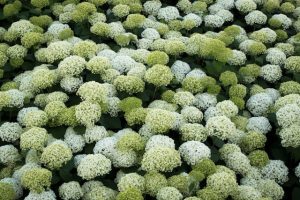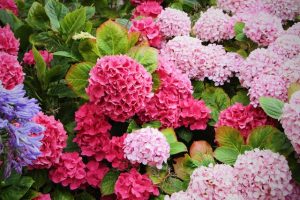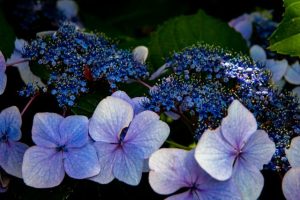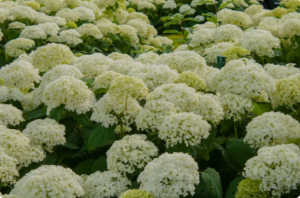A beautiful and flexible addition to any garden or floral arrangement, Annabelle blossoms known for their delicate, spherical form and vivid white blooms are quite striking. Annabelle blooms, a variety of hydrangeas, are prized for their easy-to-grow nature and big, stunning clusters. Annabelle flowers are a great choice whether your goal is to create a stunning floral centerpiece or give your landscape a little elegance. This post will go over Annabelle flower beauty, maintenance, and usage, therefore providing you with a complete guide on including them into your house or yard.
What are Annabelle Flowers?

1. The Beauty of Annabelle Hydrangeas
Large, spherical flower heads of Annabelle blossoms, a kind of hydrangea, can reach up to 12 inches in diameter. Usually white, these flowers may change to a light green color as they age, giving much more beauty to your landscape. Easy growth, endurance, and capacity to flourish in a range of soil kinds define the Annabelle hydrangea.
- Tip: In floral arrangements and landscaping, the subtle greenish color of maturing blooms can be quite appealing.
2. Common Features of Annabelle Flowers
- Shape: Annabelle hydrangeas feature large, rounded blooms made up of tiny florets clustered together.
- Color: While the flowers begin as pure white, they often mature into a pale green or sometimes even pinkish tones, depending on the growing conditions.
- Size: The flower heads can reach up to 12 inches in diameter, making them a standout in any garden or bouquet.
- Height: Annabelle hydrangeas typically grow to 3-5 feet tall and can spread up to 5 feet wide.
Annabelle Flower Growing Techniques

1. Perfect Growing Conditions
Though they can withstand full sun, particularly in temperate locations, Annabelle hydrangeas flourish in somewhat shaded conditions. They like somewhat acidic to neutral moist, well drained soil. Maintaining good development and avoiding root rot depend on correct soil drainage.
- Tip: One way to increase soil drainage is to think about incorporating organic matter like compost to your plant bed.
2. Hydrangea Planting Annabelle
Plant your Annabelle blossoms in the spring or early fall such that the spot gets some morning sunlight but is shaded during the hottest of the days. Hydrangeas flourish between 65 and 75°F.
- Tip: Space each plant 4–5 feet apart to let their wide dispersion stimulate good airflow.
4. Maintenance and Pruning
Annabelle hydrangeas must be pruned if they are to remain looking their best. These plants bloom on fresh wood, thus it’s preferable to cut them back in early spring before fresh growth starts. To encourage robust fresh development, cut the stems to roughly six inches above the ground.
- Tip: For extending the blossoming season, Annabelle hydrangeas bloom later in the summer—just perfect.
Uses of Annabelle Flowers

1. Landscaping
Because of their lovely, big blooms and simplicity of maintenance, Annabelle flowers are extensively utilized in landscaping. From building hedges or borders to accenting other plants, they work great in both formal and informal garden environments.
- Tip: For a striking mix in color and texture, pair Annabelle blossoms with other perennials like astilbe or hostas.
2. Flower Presentations
Annabelle hydrangeas big, generous heads fit perfectly for cut flower bouquets. Whether used in indoor or outdoor flower creations, they give weddings, anniversaries, or any other special occasion a romantic and timeless touch.
- Tip: To keep longer-lasting cut flowers vivid for up to a week, refresh the water often and include floral food.
3. Wedding Flowers
Because of their gentle, graceful appearance and adaptability, Annabelle flowers are often included in centerpieces and wedding bouquets. Whether your wedding is conventional white, rustic, or soft pastel, these flowers are ideal for brides and event designers both.
- Tip: For a lovely and luxuriant bridal bouquet, pair Annabelle hydrangeas with roses or peony.
Maintaining Annabelle Flowers

1. watering Annabelle hydrangeas
Annabelle flowers especially in hot weather months call for consistent watering. Maintaining constant moisture, avoid making the soil waterlogged. To guarantee the roots have enough moisture, water thoroughly; but, let the soil dry somewhat between watering to prevent waterlogging.
- Tip: Mulching around a plant’s base will aid to retain moisture and chill the roots.
2. Lighting fertilization
Particularly in the spring before fresh growth begins, annual fertilizing helps hydrangeas. Since it supplies nutrients all over the growing season, a balanced, slow-release fertilizer is best.
- Tip: Use a fertilizer heavy in phosphorus to encourage robust blooms and root development.
3.Winter Maintenance
Annabelle hydrangeas should be ready for winter even though they are hardy in USDA zones 3–9. Mulch around plant bases in colder climates to guard against freezing of the roots. You can also trim back the stems following the first frost to prevent damage during the winter.
- Tip: If your area experiences really severe winters, think about covering the plants with burlap to provide additional defense.
Where might one get Annabelle Flowers
Several local garden centers and internet nurseries have these lovely hydrangeas for sale if you wish to include Annabelle flowers into your yard or house. There are several sizes and variations of them.
Conclusion
Anyone wishing to accentuate their garden or event with classic elegance will find Annabelle blossoms to be a magnificent, adaptable, and simple-to-grow choice. These hydrangeas are elegant and charming whether your use them for wedding bouquets, floral centerpieces, or gardening. Annabelle flowers will be beautiful year after year if you know how to plant, preserve, and arrange them. These hydrangeas will blossom brilliantly with correct care, giving your house or garden a gentle natural touch.

